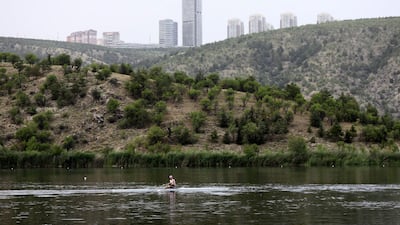The Paris climate accords are set to go into effect this week in Turkey, the last of the G20 states to embrace the world’s main climate pact and commit to net-zero carbon emissions by 2053. So why did Recep Tayyip Erdogan, Turkey's President, decide against attending the ongoing Cop26 climate conference in Glasgow?
The official reason was "security concerns", but even as Turkey steps into the international community of global warming warriors, it sees fit to keep one foot in humanity’s eco-unfriendly past. That’s the climate change cha-cha-cha Mr Erdogan has spent much of his career perfecting.
As Istanbul mayor in the mid-1990s, he warned that a third bridge over the Bosphorus would be the death of the city. But as the nation’s leader some years later, he approved its construction, and the destruction of some of Istanbul’s last forests, then spoke at the 2016 opening of Sultan Selim Bridge.
That megaproject was part of Mr Erdogan’s $200 billion construction-led infrastructure agenda, which, for about a decade, helped spur economic growth. To counter complaints about the resulting environmental damage – most notably during the nationwide Gezi protests in mid-2013 – the government embarked on a record-setting tree-planting campaign.
Since taking power in 2002, the government of the Justice and Development Party (AKP) says it has planted more than 4bn trees and hopes to reach 7bn by 2023. And last week, Mr Erdogan laid out plans to establish more than 400 national gardens, including at Istanbul’s former Ataturk Airport, and green 66 million square metres of land.
But Turkey's forestry union chief said last year that up to 90 per cent of government-planted saplings have died due to lack of rainfall or being planted at the wrong time of year. And earlier this year, Turkey’s Mediterranean coast saw its most devastating wildfires in decades and sea slime choked ports across Istanbul and the Marmara Sea, with a top Turkish ecologist citing rapid urbanisation, deforestation, runoff and soil erosion as key factors in both.
Many big cities have struggled with water shortages over the past year, as persistent drought has left Turkey water-stressed. Dozens of new mines and dams – such as the massive Ilisu Dam, which required the submersion of an ancient village and opened this past Saturday – have imperilled ecosystems across the country. Yet, minutes after the Turkish Parliament ratified the Paris Agreement last month, legislators approved a bill making the country eligible for nuclear waste transfer, potentially turning Turkey, as one columnist put it, "into a nuclear waste dump".
Of course, amid economic troubles and a lingering pandemic, determining energy and climate policies these days is complicated business. Consider that on the sidelines of the most important climate conference in years – at which US President Joe Biden called on the oil and gas industry to reduce harmful emissions – US Secretary of State Anthony Blinken urged US allies to increase oil and gas production.

With Morgan Stanley expecting gas prices to rise 40 per cent by 2030, Turkey’s recent natural gas discovery in the Black Sea is likely to take on greater import. Yet, a new report from several European NGOs urges Turkey to end coal subsidies and make its fossil fuel companies responsible for their emissions, embracing the “polluter pays” principle.
Offering a progressive counter to Mr Erdogan, Istanbul Mayor Ekrem Imamoglu, who is widely seen as a top presidential challenger, will attend the Glasgow summit to speak on two panels as an urban sustainability expert. His experience battling the environmental impact of government decisions – such as its $20bn canal meant to bisect the city’s European side – may have earned him the invites.
Skipping out on Cop26 may have already put Ankara in a hole. Turkey is among the more than 130 countries that signed onto the first big initiative to come out of Glasgow, a commitment to end deforestation by 2030. Yet, it is not among the nearly 100 countries joining the UK-India plan to link the world’s green power grids and spur faster roll-out of low-carbon technologies. Nor is Turkey among the 90 countries that signed onto the EU-US initiative to cut methane emissions 30 per cent by 2030.
Turkey’s agricultural production has fallen sharply in recent years, and its farmers are deep in debt, as I detailed in August. Just last week, a Greek climate scientist predicted further decreases in farm output across the eastern Mediterranean region. Ankara would thus have been wise to join the US and the UAE, two states with which it has sought better ties of late, in investing billions to boost agricultural innovation and climate adaptation.
The world has made some progress on climate in recent years, reducing the expected temperature increase by the end of this century from a cataclysmic 4°C to a merely devastating 3°C. Much still needs to be done, and Glasgow may be, as US climate envoy John Kerry put it, the "last best hope for the world to get its act together".
Citing what’s known as climate debt, Ankara believes developed states shoulder the greatest burden when it comes to saving the planet. “Whoever savagely exploited natural resources needs to make the largest contribution to the fight against climate change,” Mr Erdogan told the UN in September.
But China overtook the US as the world’s largest emitter of greenhouse gases back in 2006, and developing states such as Turkey have been exploiting resources for decades. At some point, Ankara will need to acknowledge its exploitative policies and fully join the global fight against climate change, rather than going halfway and passing the blame.
For the welfare of Turkish citizens let’s hope it’s sooner rather than later.


